Courageous COVID Doctor Dr. Mary Bowden's Medical Establishment Fight
Doug talks to Dr. Mary Bowden, courageous COVID era doctor.
(Machine Generated)
Doug Truax: Welcome to the First Right podcast. Your weekly conservative news show brought to you by Restoration PAC. I'm Doug Truax, president and founder of Restoration PAC Today we're blessed to have a first-time guest and one of our COVID heroes, Dr. Mary Bowden. Now during the pandemic, she was treating her patients with therapeutics and she wasn't listening to big tech, big pharma, big media, that the only thing you can do is the vaccines and no therapeutics. And for this, she got publicly shamed, but to her credit, she was very courageous and she stuck with it. So we're really happy to have her today. And we applaud her courage. Welcome to the show. Doctor we really want to go back to the beginning really when COVID hit and a lot was going on, you're seeing patients, you're doing your thing. You've got your therapeutics going. And then the medical establishment starts talking and doing maybe different things. So just take us back to that window of time and how that played out for you even give us the month so that we kind of know the context and what you were up against in that window of time.
Dr. Mary Bowden: Right, So I say I'm an ear, nose and throat doctor. And I see a lot of people with respiratory tract infection. And I had patients coming to me who were sick at the beginning of the pandemic, and they wanted to get tested. And early on, you may remember it was very hard to get testing. And as an ENT, I was working with a slab called MicroGen DX. It was doing PCR testing for patients with chronic sinusitis. So it's a test that gives you information about bacterial infections in the sciences as a PCR test. And they came out with a saliva test for COVID. So I started using that on my patients and it was great cause I was able to get turnaround times and 24 to 48 hours is a contact free process. Patients can go to their car, spit in a cup and then leave the cup outside the office that there's no exposure risks.
And so my practice kind of morphed into this COVID hub because I was able to provide testing when testing was hard to come by, then I had patients telling me, yeah, they would test positive and we'd say, okay, well go follow up with your primary care doctor. And as we all know, many primary care doctors either refuse to see patients, they shut their doors or they said, oh, you'll be fine. Just, you know, treat it like a cold. And if you get really bad, then go to the emergency room. Well, this was more than a cold and people were obviously getting pretty sick. So the first thing I tried to do, I purposely located my clinic in a strip mall because I wanted it to be easy in and out. I can't stand the whole parking garage thing when you go to the doctor.
So I was able to provide breathing treatments and patients cars, and that started with that. And then I just started researching more and more things about what we could do to try to keep people from going to the hospital. And I basically sort of started adapted the FLC CC protocol and I've had a, you know, tweaked it a little bit with my own things and then also doing monoclonal antibodies. And so I became a testing center to a outpatient treatment center and most recently sort of the next best thing the hospital, because patients have become so worried about going to the hospital and either getting neglected or trapped or given medications they don't want to get. So I have been seeing patients who probably should be going to the hospital, but won't, and that's been very interesting because I've been able to help them much more than I would have previously thought possible by giving them basically high dose IV steroids, high dose, IV vitamin C in conjunction with, I don't know if I'm allowed to say it, if it will get banned, but that were, you know, other medications. So anyway, it's just been a gradual evolution that just sort of pivoted as needed in response to what's going on. And it's, it's, it's, it's been a whirlwind, but it's been very rewarding.
Doug Truax: Yeah. Speaking of the whirlwind. So we're just grateful for doctors like you. So what was that like though, when it started to be like, Hey, you're not doing the protocol that we expect you to do. What was the media, the medical establishment, all those types of things. What, how did, how did that feel when all that started coming through?
Dr. Mary Bowden: That's great. I, so I basically, I got into trouble because I sent an email just to my patients. So it was about 7,000 people on the email. And I was complaining about some things that I was seeing and that got me in the spot. It got me under the radar of Methodist hospital and Methodist started paying attention to what I was tweeting. And they didn't like the fact that I was tweeting against vaccine mandates and you know, talking about the potential benefits so that I word. And so they kind of went after me publicly. And you ow, prior to that, I was, I was known, you know, in a small group in Houston, but they put me sort of in the, in the, in the thrust me into the Publix spotlight and that, that was pretty bad. And since then, I've had no complaints against me to the medical board and, you know, I've gotten a lot of negative responses from the public, but you know, on the flip side, a lot of positive responses as well.
Doug Truax: Yeah. How would you say that I'm always interested when people get attacked. I would just say that's balanced out in terms of the positives, people being appreciative, maybe even, you know, increased traffic to your, to your clinic, you know, how how's it, how's it played out over time in your mind at this point.
Dr. Mary Bowden: Yeah. They go back and forth deciding, okay, is this how bad is this? You know, I'm very glad that I have helped people who needed help. And then on the flip side though, like it's had some personal problems, you have lost friends. And I mean, we all have, but I've, I've lost some friends that shocking to me. I had, I found out that one of my sons didn't get accepted to a high school. He wanted to because I was too controversial there's parties, I won't go to cause I just don't want to run into a lot of pushback or negative vibes at a party. So it's, it's, you know, it's a good, it's good, but there's also some bad.
Doug Truax: Yeah, it's tiring. I get it. You know, it's like you get out there and you, you get out on the front edge of something and especially in your case where, you know, in your heart and your mind, you know, what's right. And you're going to do that for your patients. And then suddenly you get attacked for it. And, you know, people like you, we just really, really admire your courage. And I just wonder too, how many of your peers have you talked to that have told you privately that, you know, you're, you're, you're probably right. Or I wish I would have stood up more or anything like that. I'm always interested to hear if there's there's folks out there that are staying under the radar, because they're afraid to take some heat.
Dr. Mary Bowden: Not that many.
Doug Truax: I was hoping for more so. Yeah. No, I got it.
Dr. Mary Bowden: Not totally hopeless, but not that many.
Doug Truax: Yeah. Yeah. So, so in that regard, so like, it feels, so I'm just speaking to ordinary Americans, it feels like we went from, you can trust your doctor no matter what and hear, hear what they had to say, and they'll direct you to the right, right place too. There's protocols. Now there's the medical establishment. And you know, I like you talk to a lot of people that are now super distrustful of the whole thing. And so what, what do you, what advice do you give now to people, even if they aren't your patient, just to somebody you just met and they're saying things like this, what do you, what do you tell ordinary American citizens about the state of play and what they should do?
Dr. Mary Bowden: Well, I, I would say first is you're looking for a primary care doctor. I would go to FLC cc's website and you'll find like-minded doctors. I think the direct primary care movement is to grow because of this and that that's physicians that don't contract with insurance companies or hospitals. They only work for their patients. So there, they can't be influenced by third parties. Now they're not all like-minded from what I can tell, but it's a good way to start. And yeah, I think there are going to be parallel tracks of healthcare. Now, you know, this is going to create two systems and, you know, if I had to get open-heart surgery, I, I don't think the COVID situation would be an issue, but it's for those every day sort of issues and the ongoing chronic care that I think you need to be particularly choosy about. And I think, you know, you'll, you'll, you'll find it if you do some research.
Doug Truax: Yeah, absolutely. And I think that you're, you're dead on about where this is going. I was looking at your website and the way you're set up, like you said, you don't like the parking garages, so people just walk straight in and you take good care of them and do different things. And I think you said that you try to make sure when they walk out, they're feeling better and they got the medications and things like that. And then also the direct contracting piece in my, this is my political world in my entrepreneurial world, I do health insurance and we work with a lot of self-insured employers. And that direct contracting thing is a very big deal now. And because people are seeing what's happening, if you sign these massive contracts with these hospitals, you don't know exactly how this is going to play out, but if you can find the right places and you say to your 100 or so, or 150 employees, Hey, if you've got a problem go over here. And so what, talk to that a little bit, are you seeing more and more employers? I mean, as, as has your notoriety on some level helped you in that regard? I know I'm going to do everything I can to help in that way. Cause we do have Texas clients as well. So, but what's going on with that with you?
Dr. Mary Bowden: Yeah. So I, I work with this company called Texas free market man medical management. I think this is, nah, it was Texas free market surgery, but then they've expanded and they basically send me patients who are all worked out to have some sort of ENT surgery, but because I can afford it, I, I can provide it for a more affordable price. They get sent to me and said, so that business is thriving. I don't, I haven't had any, from what I can tell, I haven't seen a dip in that and I love it because, you know, it's, it's easy. It's, you know, they've already been evaluated, worked up determined that they need surgery and they just come to me and then I get to do it. And you know, it's a win-win situation because I provide them with, you know, more efficient and more personable care than what they were receiving. It's more affordable for everyone. So I love that.
Doug Truax: Yeah. And it's created the two systems, which basically comes down to affordability and quality of care. And if it gets easier for the patients to see all that, then it's definitely going to, it's going to speed it up. So last question, have you seen anybody that, how many patients have you seen that have come in that have basically gone to somebody else and they're not vaccinated and they have COVID and, and the people, you know, at the hospital and I'm just speaking from experience. I have a friend that went, it's not vaccinated, but he got COVID he's in the hospital. The doctor shows up in a basically is like, get them out of here. I don't want to see him. And so, you know, he ends up at a doctor in the suburbs of Chicago that takes care of him and basically says, yeah, you were about a couple of days from the pneumonia was getting so bad that you're probably gonna die. And, and, you know, he gets kicked out of the hospital because he's not vaccinated. So, you know, I, that was really eyeopening now. He's fine. It's all good. But I was just shocked that that's how this is breaking out too, on the, on vaccine status to
Dr. Mary Bowden: Right. Unfortunately I don't have definite proof that this is happening, but I do hear it from patients. One thing that people should know is COVID kind of things start going badly around day seven or eight. So, and that you can intervene a day, seven and eight with high dose steroids, if needed. And that's what, how I've kept people out of the hospital. I've had people show up in my office with oxygen saturations in the eighties or low eighties. And you can, you can treat them as an outpatient with high dose. I think the high dose steroids really, and the breathing treatments really can save a lot of lives, but that day seven and eight is when things start to go badly.
Doug Truax: Well, Hey, I just really appreciate all that you've been doing. I know it's been a tough road and we're, you know, folks like us are here for you and we'll do everything to, to promote what you're doing. And like I said, I looked at all your stuff online. It's a great clinic. I would encourage anybody in Houston that wants to go a different route to, to come and see you. And thank you for standing up and doing the right thing over this last window of time.
Dr. Mary Bowden: Well, thanks so much for having me and letting me talk
Doug Truax: Well, all right. That's our show for today. Thanks so much for tuning in and for supporting conservative media. Don't ever forget that by working together and staying diligent, we can serve as can bring our country back to true greatness until next time, let's all keep praying that God will continue to bless America
First right, A new kind of new summary without the liberal slant. Every warning in your inbox, always free subscribed by texting First Right to 6 1 that's FIRSTRIGHT All caps. One word 3 0 1 6 1.
-
 10:17
10:17
ManFoWarsDotCom
1 year agoFirst Famous Doctor to Fight Covid?
217 -
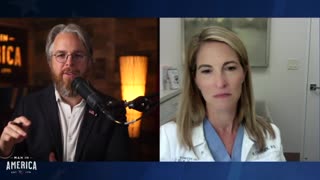 37:35
37:35
jess93
10 months agoDr Mary Bowden Exposing Covid-19 Vaccines and Ivermectin and Doctor is Suing The FDA Government
123 -
 9:32
9:32
Founder James M Murphy
1 year agoFamous Covid Doctor reveals What's really Going On.
1061 -
 9:32
9:32
Prevent Global Genocide
10 months agoINSPIRED: Famous COVID Doctor Reveals What's Really Going On - 2021
1181 -
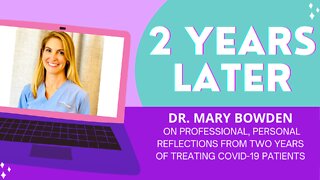 6:31
6:31
Allison Royal
2 years agoWhat Dr. Mary Bowden says she's learned two years into treating COVID-19 patients
7292 -
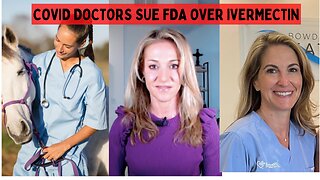 11:22
11:22
Emily Miller News
1 year agoDoctors Sue FDA to Use Ivermectin for COVID Patients | My interview with Dr. Mary Talley Bowden
3.02K32 -
 43:02
43:02
Right2Freedom
1 year agoDr. Stephen Malthouse Challenging COVID Policies: A Physician's Perspective
1551 -
 8:27
8:27
Pandemic
1 year agoDr. Jane Orient - FDA blocking Covid-19 treatment
1521 -
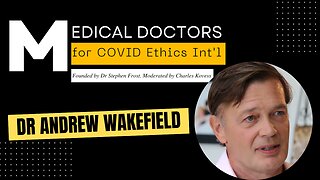 57:51
57:51
AndyWakefieldMedia
9 months agoUnveiling the Mind-Blowing Covid Discovery: Top-notch Medical Heroes Convene, Featuring Renowned Guest Speaker Andy Wakefield!
1.46K5 -
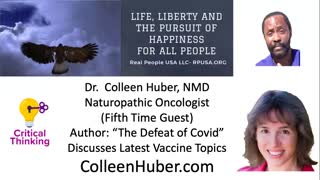 37:51
37:51
realpeopleusa
1 year agoDr. Colleen Huber, NMD Naturopathic Oncologist, Author: “The Defeat of Covid
50